The Crinan Canal is a 9-mile, 15-lock passage between the Scottish villages of Ardrishaig and Crinan. The canal came online in 1801, largely serving commercial traffic and allowing them to avoid the longer run around Kintyre Peninsula and the exposed and current-swept Mull of Kintyre. Today the lock system is used by recreational boaters either avoiding that same long run around the Mull of Kintyre or just wanting to experience the beauty of the canal.
We have transited large lock systems in Dirona, including the Columbia and Snake river locks, but what makes the Crinan Canal special is the intimacy of the trip. The canal is barely bigger than the boat, the Scottish countryside is beautiful, and the locks are all operated by hand. Boaters have to run the locks themselves including providing the “horsepower” to open and close the large wooden gates and actuate the sluice gates. This makes for a really fun trip and, with only two people on the boat, it’s surprisingly busy.
As is often the case in Scotland, we had driving rain, bright sun, still conditions, and wind gusts to 30 kts. The rain and wind made things more challenging with Jennifer on shore operating the locks and James on the boat moving in and out of the locks and tending the lines.
The video below shows footage from our three-night passage through the canal, with additional photographs and commentary from Aug 14th through 18th, 2017 following. Click any image for a larger view, or click the position to view the location on a map. And a live map of our current route and most recent log entries always is available at http://mvdirona.com/maps
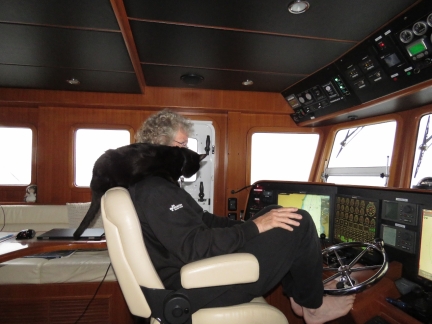 |
Parrot
Position: -4 55.50, 55 54.59
Spitfire doing his pirate’s parrot imitation. We’re underway from Greenock to start our cruise of Scotland’s west coast. We’ll stop for a night near Tarbert, then enter the Crinan Canal tomorrow.
|
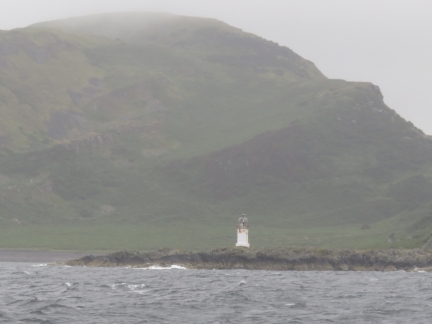 |
Rubh’An Eun
Position: -4 59.61, 55 43.78
The Rubh’An Eun light on the south end of Bute Island on an overcast and rainy day.
|
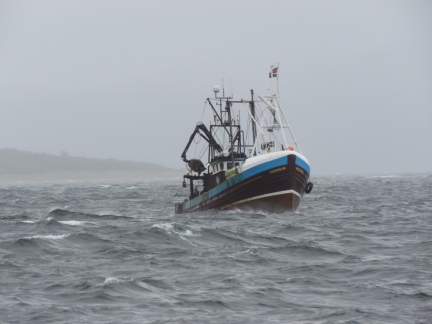 |
Caledonia
Position: -5 12.33, 55 47.35
The fishing vessel Caledonia, with it’s bow almost entirely out of the water, running against southerly waves in Bute Sound. Winds are blowing steady 25-30 from the south and the waves, while not very large, are close together. Conditions were a little better when we were heading south, before turning north into Bute Sound, but we were still pitching a bit.
|
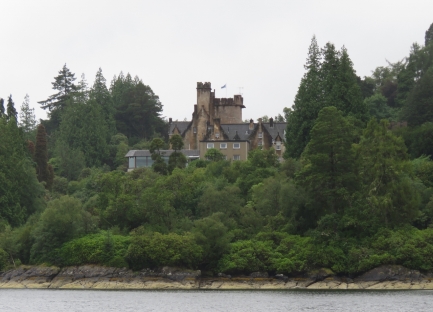 |
Stonefield Castle
Position: -5 24.82, 55 53.66
We’re anchored below Stonefield Castle north of Barmore Island. The castle dates back to 1837 and is now a hotel. At nearly 100ft, the anchorage is deep, but is one of the few offering southerly protection in the area. The anchor held well, and are enjoying the cove and being ‘back in the wilds’ again.
|
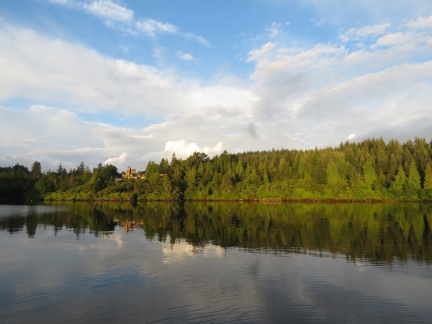 |
Morning Calm
Position: -5 24.81, 55 53.64
Yesterday’s strong winds settled overnight and we woke up to a beautiful, calm anchorage.
|
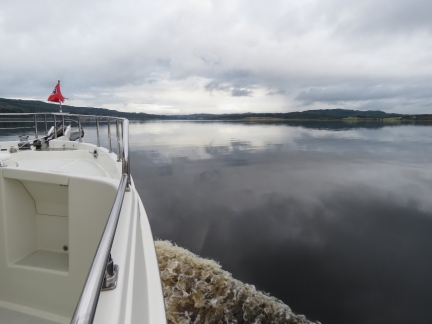 |
Smooth Seas
Position: -5 25.80, 55 59.26
Easy cruising in smooth seas as we run north through Loch Fyne toward the Crinan Canal.
|
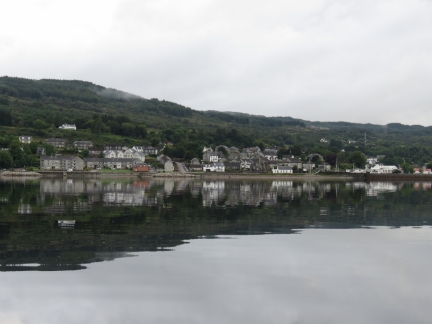 |
Ardrishaig
Position: -5 26.47, 56 0.51
The village of Ardrishaig, population about 1,200, at the southern entrance to the Crinan Canal.
|
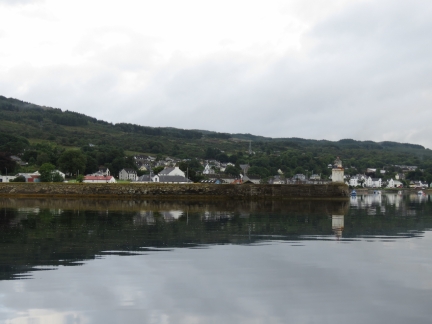 |
Breakwater
Position: -5 26.49, 56 0.70
The Ardrishaig breakwater protects the sea lock entry from big southerly winds and waves. We’d have welcomed it yesterday, but don’t need it today.
|
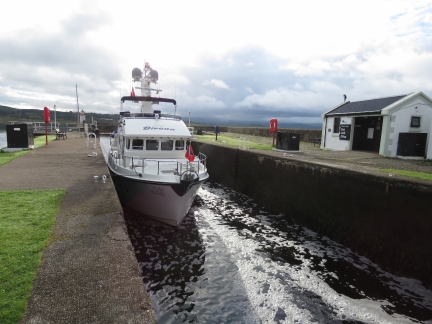 |
Crinan Canal
Position: -5 26.75, 56 0.73
Tied off in the sea lock to enter the Crinan Canal. The canal was built between 1793 and 1801 through the neck of Kintyre Peninsula, allowing boats to pass from the Firth of Clyde to the Sound of Jura and avoid 80 miles of exposed, high-current waters around the Mull of Kintyre. We’d arrived about a half hour before the first locking at 8:30am, so tied off and took a walk around until the locks began operation.
|
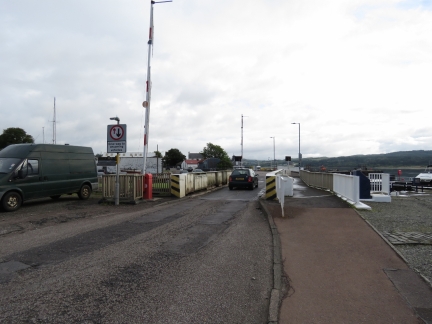 |
Bridge
Position: -5 26.79, 56 0.74
The Ardrishaig Sea Lock Bridge crosses the canal just inside the sea lock, so we’ll need it opened to proceed from the sea lock into the canal.
|
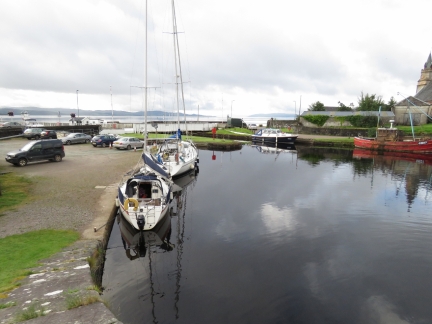 |
Ardrishaig Basin
Position: -5 26.83, 56 0.77
A few boats moored around Ardrishaig Basin, just inside the sea lock and bridge.
|
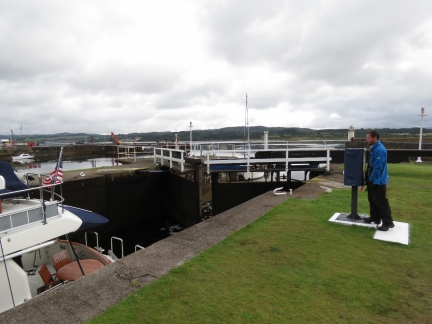 |
Gate Closing
Position: -5 26.76, 56 0.72
Once the Scottish Canal staff arrived, we payed our transit fee of pound;12.15 per meter and they locked us through.
|
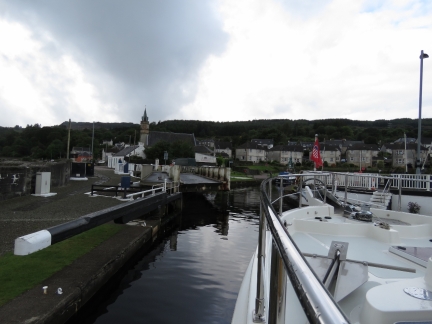 |
Bridge Opening
Position: -5 26.79, 56 0.73
Once the inside sea lock gate was open and we were ready to proceed, the canal staff opened the bridge beyond. They minimize the amount of time a bridge is open and only open them when a craft is ready to pass through.
|
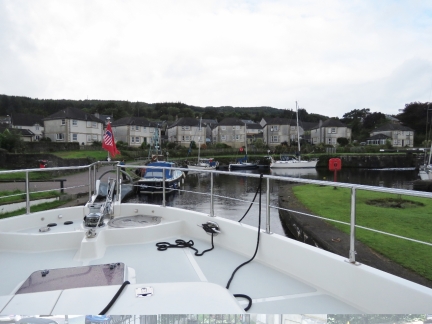 |
Entering Basin
Position: -5 26.81, 56 0.73
We had to make a tight 90-degree turn to enter Ardrishaig Basin after the bridge. One of the canal staff is at the stern of the blue boat on our left, pulling it closer to shore to give us room to pass through.
|
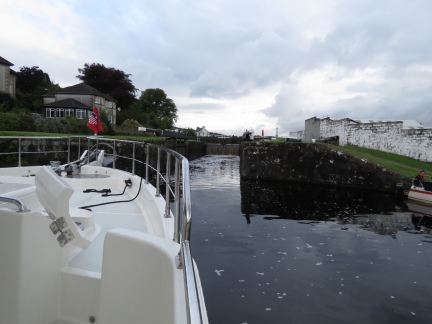 |
Lock 2
Position: -5 26.84, 56 0.76
Entering lock 2. Dirona feels very large here.
|
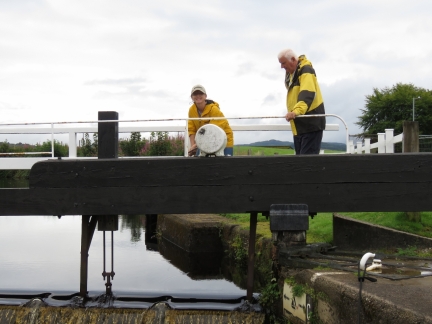 |
Winding Sluice
Position: -5 26.83, 56 0.77
The bridges and sea locks are operated by canal staff, but most of the 14 inland locks are manually operated. Crew of boats passing through must open and close the gates and raise and lower the sluices to control the water level. Here Jennifer is winding open the sluice on the forward gate to fill the lock.
|
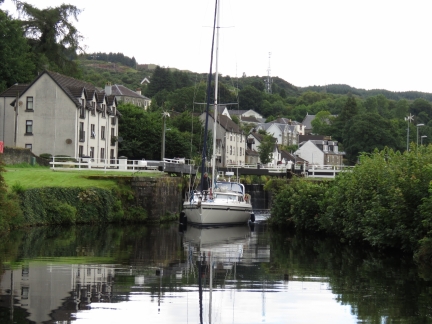 |
Lock 3
Position: -5 26.86, 56 0.83
Sailboat exiting lock 3. The inland locks are smaller than the sea lock.
|
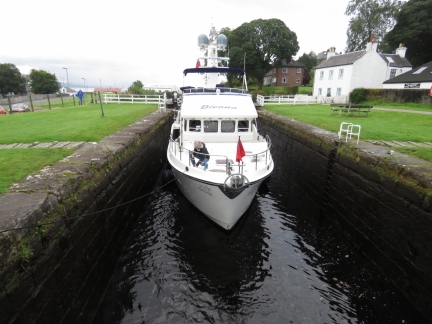 |
Securing Line
Position: -5 26.89, 56 0.86
James securing the bow line after Jennifer had hooked them on-shore.
|
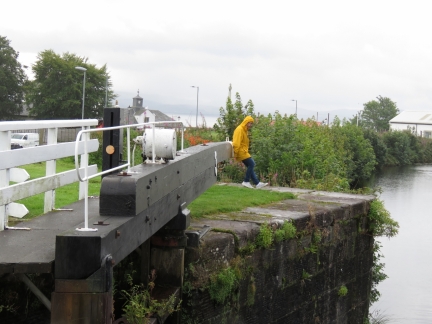 |
Closing Gate
Position: -5 26.89, 56 0.86
Jennifer closing the lock gate. The best way to do this is to use your back and legs to provide the power. The gates can take a little work to get started, but move reasonably well once free.
|
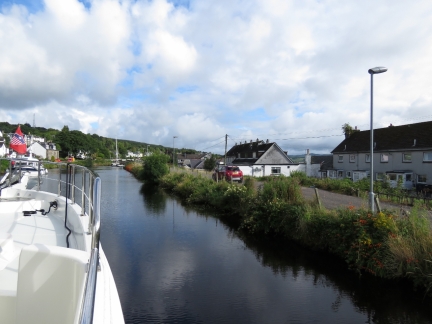 |
Roadside
Position: -5 26.93, 56 0.92
Travelling alongside the road through the canal. We really enjoyed the transit. The scenery was beautiful and it was such an adventure to be running through such a narrow and shallow channel. We often see depths in the 8-ft range and occasionally in the 7-ft range.
|
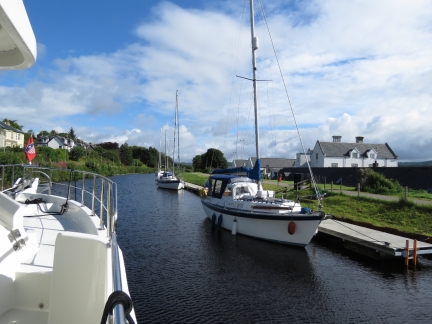 |
Transit Jetty
Position: -5 26.96, 56 1.08
The transit fee includes four nights moorage within the canal in the basins at either end or at several transit jettys along the way. Several vessels were moored on the transit jetty just beyond lock 4.
|
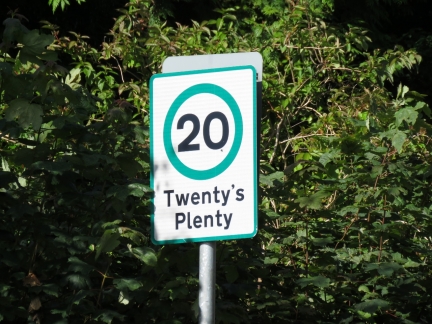 |
Twenty’s Plenty
Position: -5 26.86, 56 1.25
We got a chuckle out of this speed limit sign on a road visible from the canal.
|
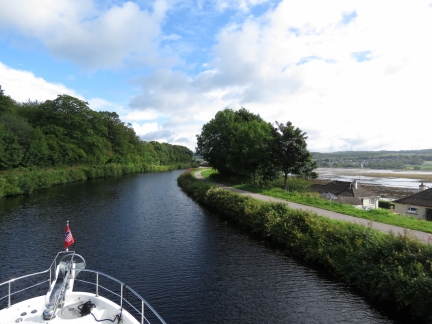 |
Loch Gilp
Position: -5 26.72, 56 1.65
Loch Gilp, on the right, extends north from the Ardrishaig to the village of aptly-named Lochgilphead. We’re near the head now and are 32 feet above sea level. The maximum speed limit in the canal is 4 knots, and we’ve been enjoying this leisurely cruise through the country-side.
|
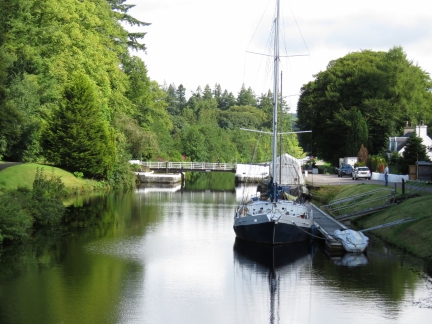 |
Oakfield Bridge
Position: -5 26.60, 56 2.12
Approaching Oakfield Bridge at the village of Lochgilphead. The bridge opened as soon as we were close.
|
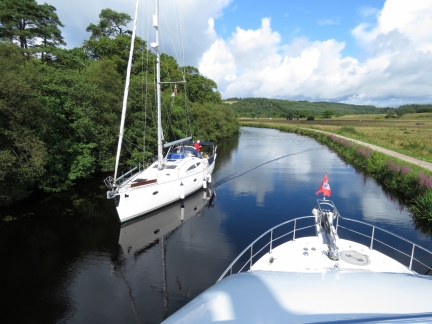 |
Narrow
Position: -5 27.70, 56 3.37
Passing a sailboat as we near loch 5. We could see them coming on AIS, but couldn’t actually see the boat around the blind corner until they were quite close.
|
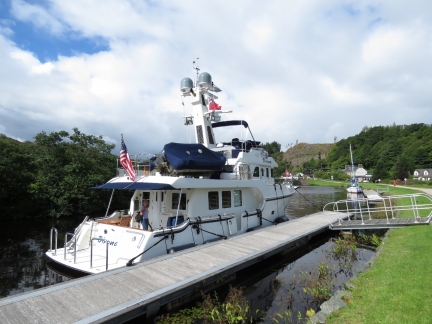 |
Cairnbaan
Position: -5 28.17, 56 3.64
Moored for the night at Cairnbaan. So far we’ve passe through four locks and 3 bridges.
|
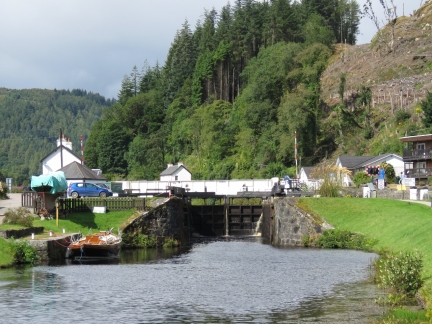 |
Lock 5
Position: -5 28.30, 56 3.66
Lock 5 is the first of ten locks that we’ll pass through tomorrow.
|
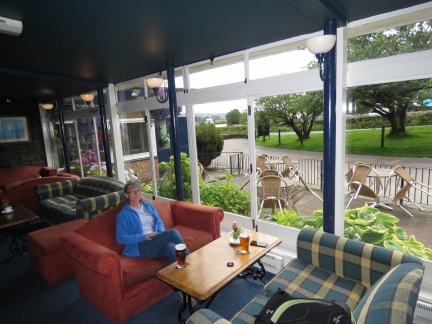 |
Bar Lock 5
Position: -5 28.32, 56 3.68
A relaxing pint and lunch in the sun-room at Bar Lock 5 pub. Dirona is just visible near center in the background of the picture.
|
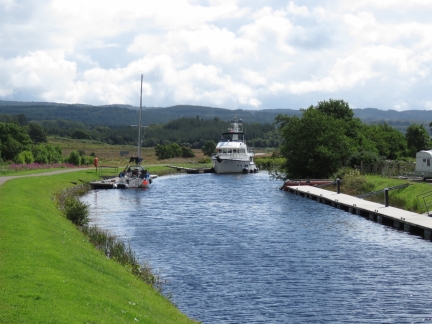 |
Moored
Position: -5 28.33, 56 3.67
Looking to our moorage from just outside Bar Lock 5. The canal is fairly narrow where Dirona is—there’s just barely room for a boat to pass.
|
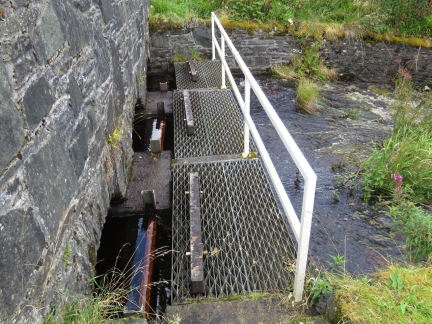 |
Level Control
Position: -5 27.47, 56 3.18
After lunch we walked south along the canal on a walkway that follows the original towpath where horses pulled unpowered craft through the canal. The walkway is popular with cyclists and pedestrians, and you can easily walk the whole nine-mile distance from end-to-end in a few hours. While walking, we passed this water level control. The pieces resting on the metal grates are dropped into the slot at left to control how much water escapes from the canal into the stream at right.
|
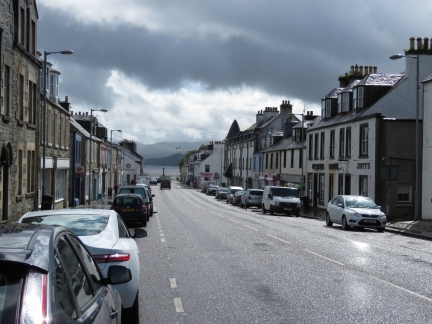 |
Lochgilphead
Position: -5 25.95, 56 2.34
Looking south down Argyll St, the main street in the village of Lochgilphead.
|
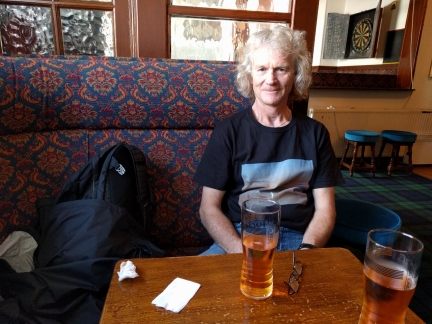 |
The Stag
Position: -5 25.97, 56 2.28
Magners Irish Cider at The Stag pub and hotel in Lochgilphead.
|
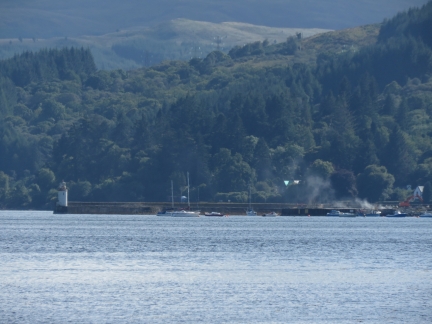 |
Ardrishaig Breakwater
Position: -5 26.12, 56 2.21
We covered less than four miles today by boat, and have walked almost halfway back to Ardrishaig. We can see the breakwater from the south end of Lochgilphead.
|
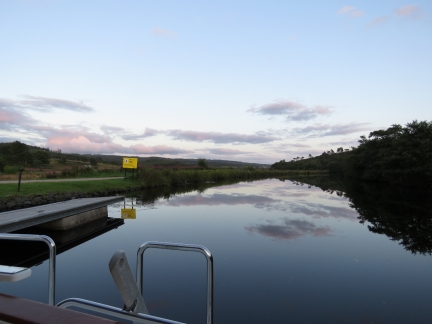 |
Dusk
Position: -5 28.17, 56 3.63
Dusk on a lovely calm evening along the canal.
|
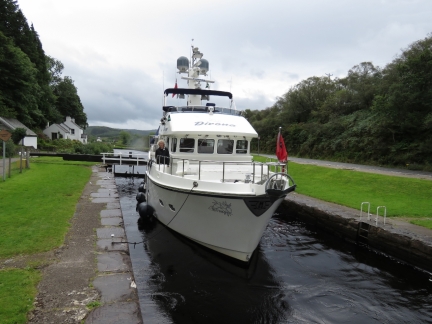 |
Lock 7
Position: -5 28.75, 56 3.63
Dirona passing through lock 7. This is our third lock today—we’ve already passed through locks 5 and 6.
|
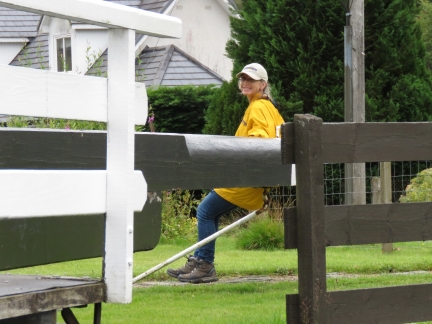 |
Closing Gate
Position: -5 28.91, 56 3.63
Jennifer closing the gate behind lock 8 once the boat is inside.
|
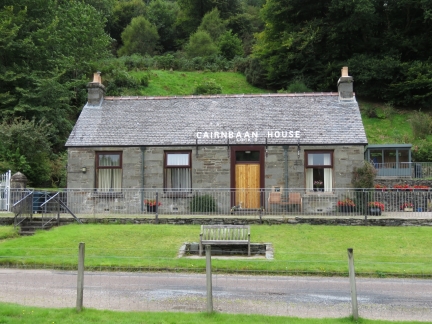 |
Lock 8
Position: -5 28.94, 56 3.63
We passed many nice houses and cottages alone the canal, but Cairnbaan House at lock 8 was one of the most attractive. Once we exit lock 8, we’ll be 64 feet above sea level, the highest point in the canal. For the rest of the locks we’ll be locking downward. This is a little easier as the lock is less turbulent when draining than filling.
|
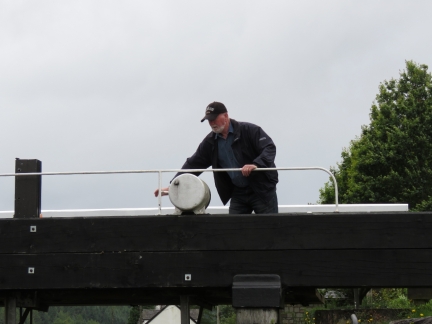 |
Assistance
Position: -5 28.94, 56 3.63
Sometimes people passing by stopped to help us with the locks. Tom helped us through both locks 7 and 8. He’d also been there when N57 Jura and N55 Odyssey passed through earlier this summer. Three has got to be a record for Nordhavns passing through in one season.
|
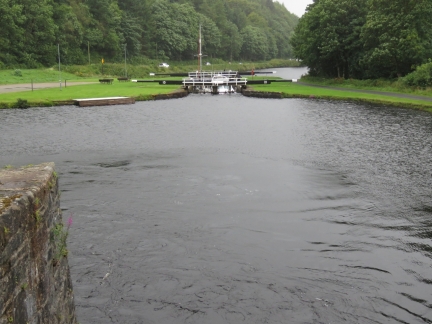 |
Lock 9
Position: -5 29.91, 56 3.74
Looking from the north end of lock 9 to locks 10 and 11. The boats in lock 10 are coming towards us—we’ll pass in the small basin ahead.
Locks 9 through 13 form a flight of locks very close together, as do locks 5 through 8. Through a flight, Jennifer stayed off the boat and walked between the locks to open and close the gates, wind the sluices and take the lines from James, who single-handed in and out of the locks. We were concerned that adjusting bow and stern lines to match the water level would be a challenge with only one person on board, but developed an approach of keeping both lines sufficiently loose to allow the locks to fully empty. The bow line basically isn’t used at all, and we just gently tug forward on the stern line to keep the boat near the starboard side wall. As the lock empties, the boat slowly moves rearward. The bigger challenge was single-handing the boat in and out of the narrow locks. Someone joked that when locking through with two people, you have the choice of two jobs: work your butt off or be scared to death. |
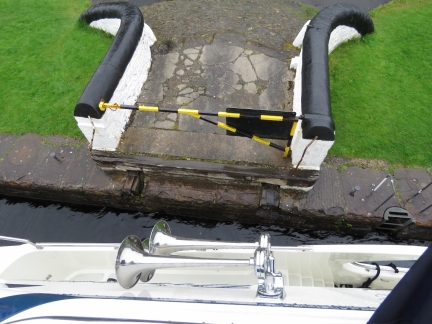 |
Dunardy Bridge
Position: -5 30.21, 56 3.83
Dunardy Bridge runs right through the middle of lock 11.
|
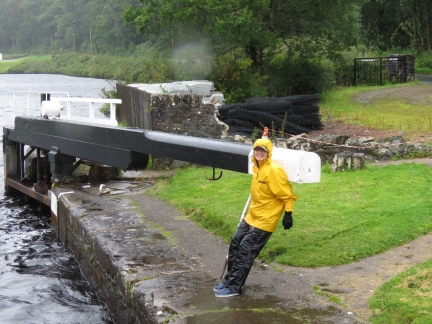 |
Lock 11
Position: -5 30.21, 56 3.83
Closing the gate on lock 11. A heavy rain poured most of the day, but we were still having fun.
|
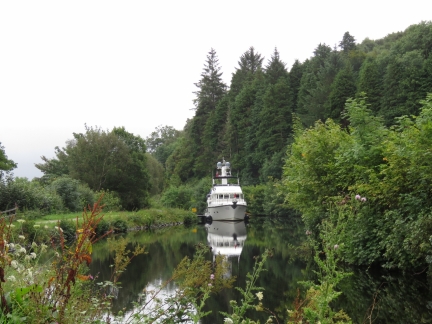 |
Moored
Position: -5 32.05, 56 4.49
We were planning to run all the way to Crinan today and spend the night there, but we couldn’t resist this beautiful single-boat mooring. And the canal has been such an enjoyable and unique experience that we didn’t want to rush through.
|
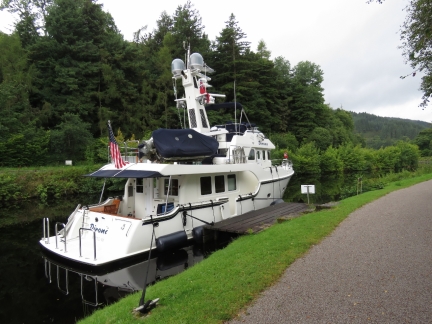 |
Cleats
Position: -5 32.05, 56 4.49
We almost didn’t stop because the dock is small, with only a single cleat. Then we noticed two strong cleats mounted on shore that would work perfectly.
|
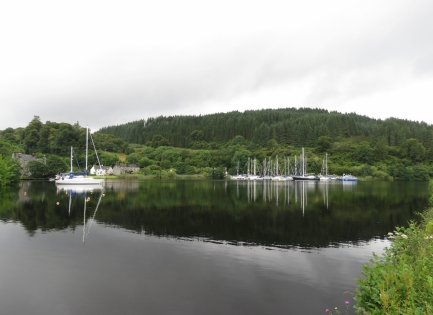 |
Bellanoch Marina
Position: -5 32.42, 56 4.60
Private Bellanock Marina just up from our moorage.
|
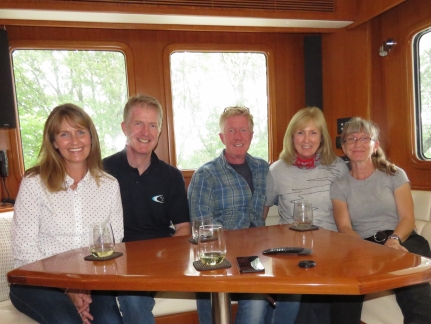 |
Turners
Position: -5 32.05, 56 4.49
Gordon and Margaret Turner (beside Jennifer), owners of Nordhavn 63 Due North, live nearby and stopped by to say hello with Gordon’s brother Alan and his wife Pauline. Gordon and Margaret have boated in the area for years and have given us lots of pointers on places to go and lent us some of the best cruising guides for the area. It was a fun visit.
|
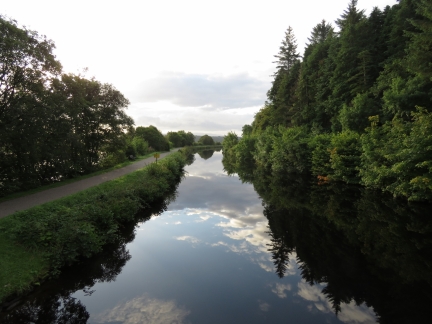 |
Morning
Position: -5 32.05, 56 4.49
Another beautiful, calm morning along the Crinan Canal.
|
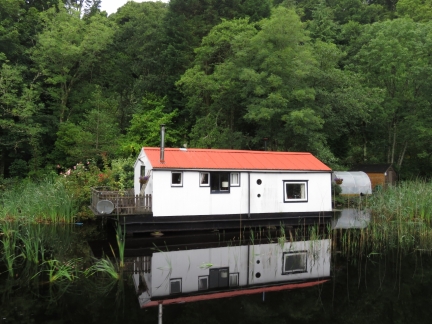 |
Float Home
Position: -5 32.94, 56 5.10
This is the only floathome we saw along the canal.
|
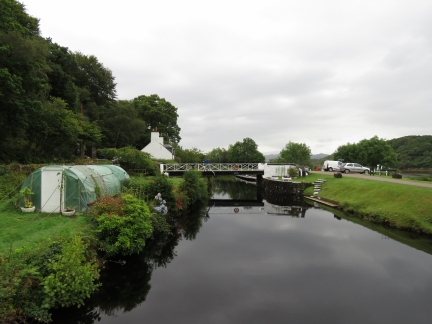 |
Crinan Bridge
Position: -5 32.91, 56 5.12
Approaching Crinan Bridge, the last bridge we’ll need opened on the canal. Despites the shallowness and the maximum 4-kt speed limit, we’ve so far we’ve had no trouble navigating the canal. Dirona is perfectly happy at 3-4 kts and we had no current to contend with. But this last section of the canal, between Bellanoch Marina and Crinan, is especially narrow and shallow and caused a surprisingly noticeable handling issue.
We’ve read of the “bank effect” in the past. This is the tendency for ship’s stern to be pulled toward the nearest bank due to pressure differentials (Bernoulli’s principle). This effect is important for commercial pilots to monitor when operating in narrow waterways. We’ve never felt the effect before and assumed it only applied to large ships in narrow channels. But the water displaced by Dirona is a large percentage of the Crinan Canal and it leads to weird handling at times. If you drift 2 to 3 feet over toward one bank, the stern will pull toward it and the bow will veer off heading the boat over to the opposite bank. The lower the speed the less the impact of this effect but, even as low as the 4-kt speed limit in the canal, we felt a pronounced bank effect that we have never before experienced. We initially thought we had a steering problem but it was just the bank effect where the bow tends to push off the bank and the stern tends to “suck” toward it. Another interesting (and related) anomaly when operating in narrow canals is the water rushes so fast from bow to stern that it drops 6 to 8 inches near the pilot house door. What appears to be happening is the passage of the boat through the still water requires the water in front of the boat to get to the stern but, since the boat fills much of the canal, we build up a several inch high plug in front of the boat and the water rushes from the bow to the stern of the boat far faster than we are actually travelling. |
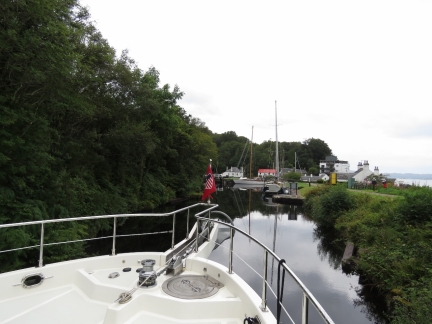 |
Crinan
Position: -5 33.24, 56 5.45
Except in the locks, we rarely used the thrusters while transiting the canal. But the last turn at the Crinan end is tight enough that a gentle bit of bow thruster helps keep the boat central. We also noticed that a light touch of the thruster would quickly break the bank effect when it begins to suck the boat over. At these speeds the rudder doesn’t have much water passing over it but the thrusters are particularly effective.
|
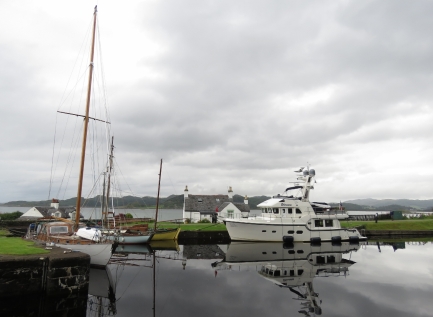 |
Moored
Position: -5 33.35, 56 5.43
Moored for the night at Crinan. Moorage along the canal generally is on a first-come, first-served basis, but the Crinan Canal staff will monitor the progress of larger vessels to help ensure a smooth transit. The Crinan Bridge operator had called ahead to Crinan to let them know we were coming, and a berth was waiting for us above lock 14.
|
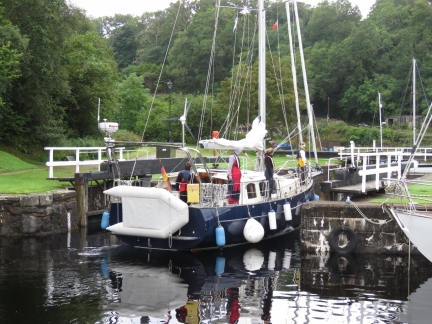 |
Lock 14
Position: -5 33.29, 56 5.45
Sailboat passing through lock 14 into Crinan Basin. We were expecting to moor in Crinan Basin and to pass through lock 14 today as well, but we were given a much better spot just outside the basin.
|
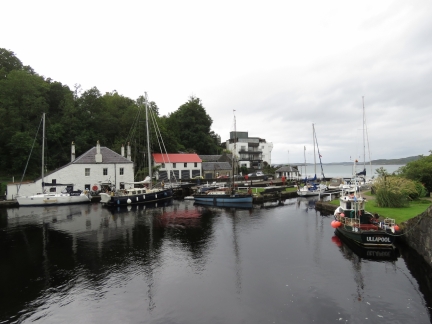 |
Crinan Basin
Position: -5 33.38, 56 5.41
Looking north across Crinan Basin. The sailboat that just passed through lock 14 is entering the sea lock at the far side of the basin. The large white building on the left is the Crinan Coffee Shop and the multi-story building at the far right is the Crinan Hotel.
|
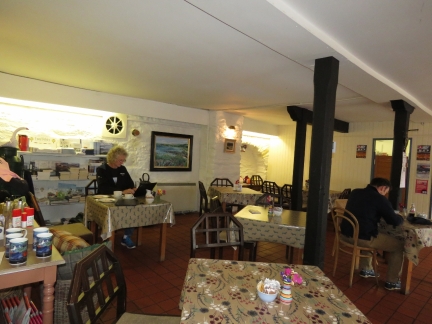 |
WiFi
Position: -5 33.41, 56 5.44
We’re using both Vodafone and O2 for cellular data connectivity, and were surprised to find no connectivity along most of the canal or in any of the towns. It’s particularly surprising that we didn’t have connectivity in Crinan, but did in the secluded part of the canal where we moored last night. To reduce our satellite data usage, we updated our devices using the Crinan Coffee Shop’s WiFi over coffee and delicious shortbread. Another customer commented that we had a surprisingly large number of devices: two laptops, two tablets, and three phones.
|
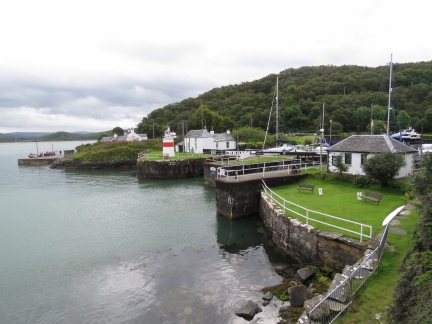 |
Crinan Lighthouse
Position: -5 33.51, 56 5.50
The Crinan sea lock with the Crinan Lighthouse beyond.
|
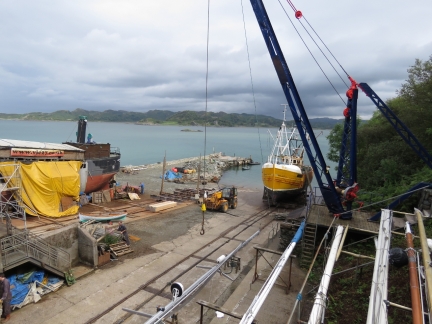 |
Crinan Boatyard
Position: -5 33.58, 56 5.48
The Crinan Boatyard looked well-equipped, with a large multi-story indoor shed. This commercial boat was being winched up the marine ways as we walked past.
|
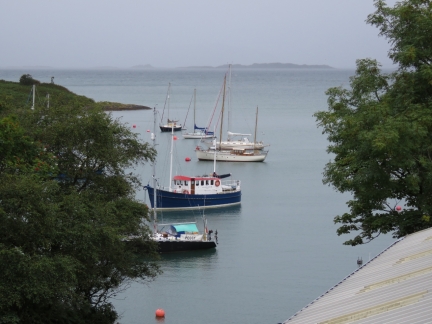 |
Crinan Harbour
Position: -5 33.61, 56 5.47
Vessels moored in Crinan Harbour, outside the sea lock.
|
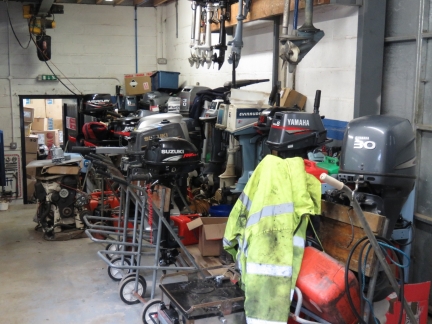 |
Outboards
Position: -5 33.67, 56 5.48
A good dozen outboard engines of all vintages and makes in for service at Crinan Boatyard. We’ve noticed a bit of an anomaly around outboard engines with respect to the wealth of the area: old engines are more common in more well-off places, and fairly rare in less-well-off places, such as throughout the South Pacific.
If maintenance and repair skills are available, old engines are kept running for years. But these skills are less common in places like the South Pacific, so engines fail more quickly and typically are replaced with new ones. |
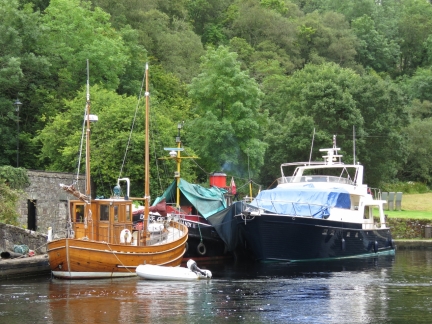 |
Duke of Normandy
Position: -5 33.29, 56 5.46
The beautiful teak vessel Sgarbh, moored in front of the Duke of Normandy. Sgarbh (gaelic for cormorant) is a refitted commercial herring boat, built in 1947 on the River Clyde in Glasgow. The Duke of Normandy is one of the few remaining Clyde Puffers, coal-fired cargo ships built on mainly on the Firth and Clyde canal that once plied the Scottish coast.
|
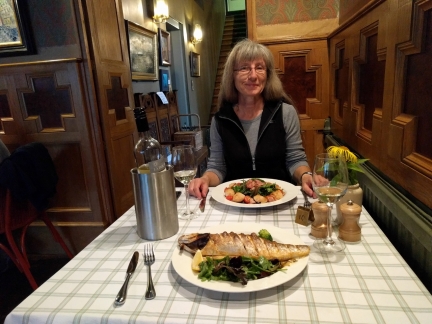 |
Crinan Hotel
Position: -5 33.43, 56 5.48
A delicious seafood dinner at the Crinan Hotel.
|
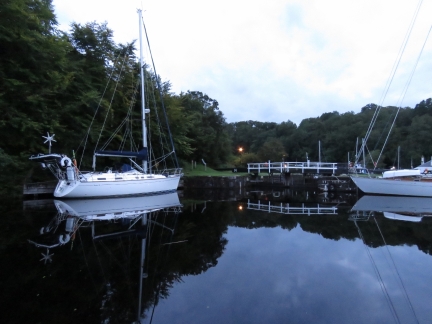 |
Dusk
Position: -5 33.29, 56 5.45
After dinner at the Crinan Hotel, we enjoyed another calm evening for our last night on the canal.
|
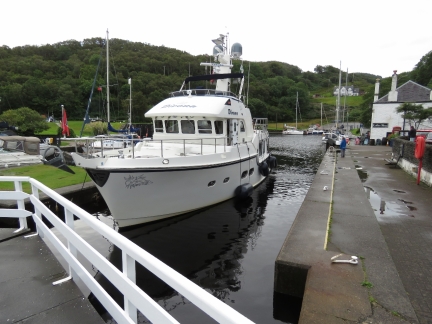 |
Crinan Sea Lock
Position: -5 33.39, 56 5.46
In the sea lock preparing to exit the Crinan Canal after passing through lock 14. The Crinan Canal staff controls the gates and sluices hydraulically at bridge crossing and the sea locks at either end, including lock 14, so these last two locks are easier for us, and much faster, than the inner locks.
|
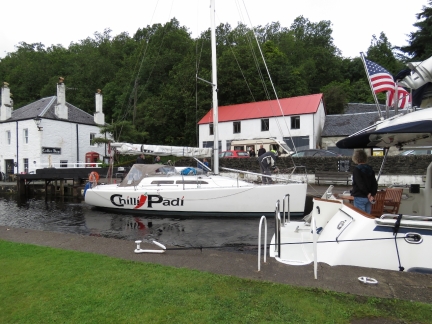 |
Chilli Padi
Position: -5 33.39, 56 5.46
For the only time on the Crinan Canal, we shared a lock with another boat. We last saw Chili Padi at Lough Swilly Marina where we made our day trip to the Causeway Coast in Northern Ireland.
|

|
Click the travel log icon on the left to see these locations on a map, with the complete log of our cruise.
On the map page, clicking on a camera or text icon will display a picture and/or log entry for that location, and clicking on the smaller icons along the route will display latitude, longitude and other navigation data for that location. And a live map of our current route and most recent log entries always is available at http://mvdirona.com/maps. |

interesting blog about the canal would the key for the lock gates be provided by the canal or would it be your own thank you
The locks are just left open for boat operators to operate themselves as they arrive. I suspect they may lock them up at night.
Thank you for the information
I was interested in you picture of “Cairnbaan House”
From 1964 to 1968 (as a teenager) I lived in the house (Shelbourne Lodge) to the left (entrance gate just to the left of your picture). Many years later, I now live in the south of England and miss the peace and tranquillity of the west of Scotland.
In those days, the building was “Cairnbaan Stores” an old fashioned grocery store with a small garage business at the back and a couple of petrol pumps the other side of lock 8.
At weekends and school holidays we often helped boats through the lock.
“Shelbourne Lodge” had a large hedge along the front of the garden and house. My father hated just seeing the masts of boats passing – he wanted to see the boat itself. Therefore, one weekend, the section of hedge in front of the house was severely trimmed to just one foot high. I see that the hedge still has that dip in the middle some 35 years later.
I agree with your father wanting to watch the boats pass. When we’re not in boats, we love watching them. The Crinan is a real Gem. Thanks for posting some of your memories of the canal from back in the 60s.
Just read your trip information and admired your lovely boat and photos. Covid Virus has closed Canal this year, and is sad to witness. Glad that you weren’t affected. I hope that Locks will not become overly stiff to operate when Canal is reopened, hopefully in 2021. Good luck.
Thanks for the feedback. Hopefully the Canal will be able to open sometime this year rather than loosing the full season.
The pictures of Dirona at that tiny jetty on your second-to-last day have to be my favorite pictures of any of your moorages. Seeing Dirona tied off in the middle of a tiny channel in the middle of the Scottish countryside is surreal and charming.
That stop was definitely one of the highlights of the Scottish leg of our trip. It was a great stop. I almost missed it in that the dock was missing a cleat and there was only one cleat on the little dock but Jennifer noticed that there were heavy cleats anchored in cement fittings in the grass. It was a really nice stop.